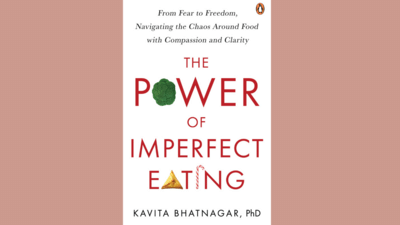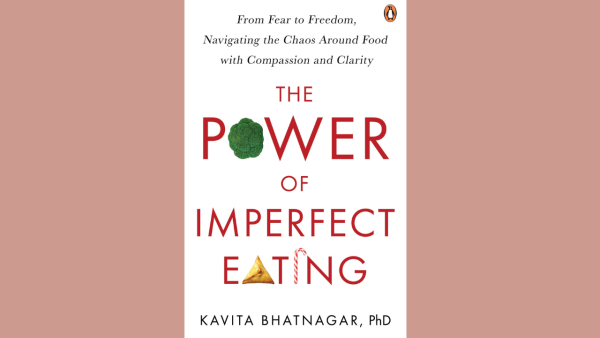
In a world obsessed with perfect diets and quick fixes, The Power of Imperfect Eating invites you to take a breath, step back, and see food through a different lens—one that values progress over perfection. This isn’t just a book about what to eat; it’s a conversation about how we eat, why we eat, and how to create a sustainable, balanced relationship with food in an imperfect world.
Through personal insights and years of experience in food science, nutrition, and psychology, the author Kavita Bhatnagar explores the messy, multidimensional nature of eating. Life is unpredictable, and so are our choices, but that’s not a barrier to health—it’s an opportunity for growth. By embracing imperfection, we can move beyond the guilt of not following rigid rules and instead focus on small, meaningful changes that accumulate over time.
This book is filled with practical strategies to help you navigate your unique eating journey, from overcoming the “all-or-nothing” trap to making well-informed dietary choices that fit your life.
The Power of Imperfect Eating isn’t a guide to flawless eating; it’s an invitation to embrace the beauty of imperfection and find joy in nourishing your body and mind.
What inspired you to write
The Power of Imperfect Eating
, and how did your personal journey influence the book’s message?
Well, it wasn’t a single moment of epiphany—it was a messy, chaotic series of realizations. I’ve been lucky to live in the intersection of so many worlds—food science, nutrition, psychology, the relentless hustle of the food industry, and the quiet whispers of human behaviour.
For the longest time, these worlds felt like they didn’t belong together. Like strangers at a party, awkwardly avoiding eye contact. But then, as I stood at the crossroads of all this chaos, something shifted. I started seeing connections where I once saw contradictions. It wasn’t just science meeting emotion or behaviour meeting biology—it was all of it crashing into each other to tell one big, messy, beautiful story about how we eat, how we live, and how we choose.
And I thought, if I can make sense of this madness, maybe I can help others too. Not with a perfect roadmap—because let’s be honest, perfection is overrated—but with a way to embrace the imperfections, the detours, the tiny choices that shape our lives. That’s how this book came to life. It’s not a guide. It’s a conversation. About food, about life, and about how we’re all just trying to figure it out one bite at a time.
Many people struggle with an "all-or-nothing" mindset when it comes to diet. How does your approach help individuals overcome this trap?
The problem with an ‘all-or-nothing’ mindset is that it often paralyzes us or sets us up for failure. It doesn’t foster change; instead, it leads to guilt, frustration, and eventually giving up. When it comes to diet, many of us think that there is one perfect way to eat. And the next thing we do is wait for the perfect moment, the perfect plan, the perfect set of circumstances to start. But here’s the truth: perfection is a mirage. We live in an imperfect world where motivations can’t always be judged, incentives can be flawed, and even our intentions aren’t always clear. So, how can we expect perfection in something as complex and emotional as eating?
Real change, I believe, lies in the cumulative impact of the choices we make over time. It’s not about being perfect every day—it’s about showing up consistently, even imperfectly.
In my book, I’ve woven together stories that advocate for this balanced perspective. Some days, we might lean on processed food because life is chaotic. On other days, we might find joy and mindfulness in cooking from scratch. Neither extreme is glorified. Instead, the focus is on progress, not perfection. It’s about finding your rhythm, embracing imperfection, and realizing that small, consistent steps can lead to big, meaningful changes.
Could you share some practical tips or strategies from your book that readers can apply to their daily lives immediately?
One of the key strategies from my book is to stop looking at food in isolation. Eating isn’t just about nutrition—it’s a multidimensional experience. Food is social, emotional, cultural, and deeply personal. It’s a thread that runs through our entire lifestyle, shaping our daily routines and even our memories. Acknowledging the true role of food in our lives is the first step to a healthier relationship with it.
Here are some practical tips to help you integrate this perspective into your daily life:
1. See the big picture: Avoid fixating on single ingredients or nutrients. Instead, focus on your overall eating patterns and how they align with your goals and values.
2. Set yourself up for success: Make less healthful choices less convenient by creating small hurdles, and simplify access to more healthful options. Small environmental changes can significantly influence habits.
3. Assess the credibility of information: Not all advice is created equal. Learn to discern between credible knowledge and noise. Understand the source and reliability of the content you consume, as well as the difference between sensationalism and evidence-based guidance.
4. Embrace progress over perfection: Remember, food choices aren’t about being perfect every time. They’re about striving for gradual improvement and building habits that reflect your values and lifestyle.
5. Be Patient with yourself: Change takes time. Celebrate small wins and remember that consistency trumps perfection. Progress, no matter how incremental, is what ultimately leads to long-term success.
Can you elaborate on "imperfect eating"? Also, guide our readers in how to make a well informed choice in diet.
Imperfect eating reflects two perspectives. The first is a lack of mindfulness—eating without considering the impact on long-term health goals. This might involve frequent indulgences in foods that offer immediate satisfaction but, when consumed excessively or without balance, could lead to imbalances in energy, well-being, and overall quality of life.
The second, more empowering perspective embraces flexibility without striving for unattainable perfection. It’s about making choices that align with your circumstances and values in the moment. For instance, savoring a slice of cake at a celebration or opting for convenience during a busy day doesn’t derail your health journey when approached with balance. This perspective acknowledges that food is neither inherently “good” nor “bad”—its role depends on how it fits into your overall lifestyle.
At its core, imperfect eating is about prioritizing progress over perfection. It recognizes the realities of life, where rigid rules are neither practical nor necessary for health. Instead, thoughtful choices that align with personal goals and sustainable habits foster a balanced relationship with food.
 How to make well-informed diet choices:
How to make well-informed diet choices:
1. Understand your unique needs
Recognize that there’s no one-size-fits-all diet. Your age, activity level, health conditions, cultural background, and personal preferences all play a role in determining what works best for you. Consult a qualified professional if you’re unsure.
2. Focus on patterns, not perfection
Instead of fixating on individual meals or foods, evaluate your overall eating habits. A balanced diet is about consistently choosing nutrient-rich foods while allowing room for occasional indulgences.
3. Read and interpret labels thoughtfully
Learn to read food labels critically. Focus on key information such as portion size, added sugars, sodium, and ingredient lists. Avoid being swayed by marketing claims like “natural” or “low-fat” without understanding the full nutritional context.
4. Assess the credibility of your sources
Not all dietary advice is created equal. Rely on evidence-based information from credible organizations, registered dietitians, or peer-reviewed research. Be cautious of trends and influencers without scientific backing.
5. Prioritize whole, minimally processed foods
Base your diet on a variety of whole foods such as vegetables, fruits, whole grains, lean proteins, and healthy fats. While processed foods can fit into a balanced diet, aim to limit those high in added sugars, unhealthy fats, and sodium.
6. Listen to your body
Pay attention to hunger and fullness cues. Eat when you’re genuinely hungry, not out of boredom or stress, and stop when you feel satisfied, not overstuffed.
7. Be flexible and realistic
Life happens, and diets should adapt to your circumstances. A well-informed choice doesn’t mean adhering to rigid rules but making decisions that align with your health goals and current situation.
8. Plan ahead
Preparing meals and snacks in advance can help you avoid impulsive, less healthful choices. Keep nutritious options readily available at home and work to make eating well more convenient.
9. Embrace balance and moderation
Enjoy a wide variety of foods without overly restricting any single type. Balance indulgent foods with more nutrient-dense choices to maintain a sustainable approach to eating.
10. Stay open to learning
Nutrition science evolves, and so can your diet. Stay informed, be curious, and adjust your choices as new evidence or life circumstances arise.
 In a world obsessed with perfect diets and quick fixes, The Power of Imperfect Eating invites you to take a breath, step back, and see food through a different lens—one that values progress over perfection. This isn’t just a book about what to eat; it’s a conversation about how we eat, why we eat, and how to create a sustainable, balanced relationship with food in an imperfect world.
In a world obsessed with perfect diets and quick fixes, The Power of Imperfect Eating invites you to take a breath, step back, and see food through a different lens—one that values progress over perfection. This isn’t just a book about what to eat; it’s a conversation about how we eat, why we eat, and how to create a sustainable, balanced relationship with food in an imperfect world.
